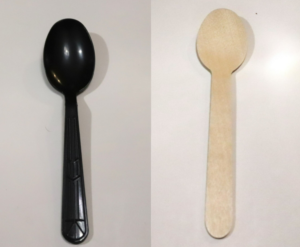Donating, not discarding
Caption: Students line up to get food from the Jefferson cafeteria. “[This policy is] mostly behind the scenes, we’re trying to eliminate some food waste is all,” junior and Treasurer Matt Sprintson said.
October 17, 2022
Sometimes you just can’t finish your lunch. Maybe it’s 12:38, and there’s still an unopened cup of fruit or a bag of Cheez-Its on your tray. For now, this food often ends up in trash bins. Soon, the Student Government Association (SGA) hopes to have that food end up in very different bins.
SGA is planning the introduction of a policy that will donate cafeteria food that is not served to or eaten by students through the installation of bins and a refrigerator. The policy aims to reduce food waste by storing food to be donated to food banks or local schools.
Junior and Policy Committee Director Shrishti Ghosh first proposed the policy last year after seeing parts of Fairfax County Public High Schools’s (FCPS) free lunches going to waste.
“This was back when we had free lunch,” Ghosh said. “There was a lot of excess food being thrown away because people were required to take a vegetable, … [but] a lot of people didn’t eat them, so it went to waste. Why not let it be useful and go to someone who needs it?”
Junior and treasurer Matt Sprintson, who is also working on the policy, said that the original proposal was to store cafeteria food and have it driven to a food bank.
“We [planned to] take leftover food from the cafeteria and store it somewhere safe, and then every other week or so we would have a driver, a parent, take it to the Arlington Food Assistance Center,” Sprintson said.
The policy has evolved from its original proposal, and is aiming towards donating food directly to local FCPS schools.
“We researched into … donating food to food banks, but then we thought it was a better idea to donate it to local FCPS schools. There’re schools like Weyanoke [Elementary School] and Justice [High School], who … have a high percentage of free and reduced lunch students,” Ghosh said. “We are starting to figure out all of the logistics, and we’re finding a fridge to keep perishables and setting up a system.”
The policy is still in the early planning process, and does not yet have a formal name.
“We’re in the first initial phases of getting it approved and going through those steps,” Sprintson said. “Once we actually get approval, we find out the logistics and make sure we have drivers, then we’ll come up with branding and try to get it out to the public.”
The policy would involve bins put throughout the school for student donations and a refrigerator installed in the cafeteria for safely storing food.
“What we physically need [are] a fridge and bins. We found a fridge. We’re currently in the process to request if we can use it or not, and move it to the cafeteria,” Ghosh said. “The bins are for [collecting], so when a student decides, ‘Oh, I don’t want to eat this [bag of] goldfish today,’ they can put it in the bin, and then it makes for easier access to donation, so … if I’m eating in Hopper, I don’t have to come down to the cafeteria to give my food, I can put in a bin and someone else will come and collect it.”
Student donations would be subject to guidelines and would apply exclusively to unopened food.
“This is definitely unopened food, [both] perishables and non-perishables. The perishables will be stored in a fridge,” Ghosh said. “There’ll be specific guidelines; there’s a list that FCPS requires.”
Through this policy, Ghosh wants to turn donating unopened food into a regular part of Jefferson life.
“My goal is to make this a habit for [Jefferson] students. If they don’t eat food, I don’t want them to throw it away, I want them to donate it and have that be a habit that they develop that is just natural to them,” Ghosh said.
Sprintson noted that the refrigerator would be useful for SGA’s activities.
“I know last year when I was running the boba for [class] 2024, we needed somewhere to store [it]. The cafeteria the first time was gracious enough to let us use [their refrigerator], the second time … we had to use our own refrigeration,” Sprintson said. “We’ve been wanting to get a refrigerator for a while, just to help out with clubs who might want to store stuff, and just store stuff for our own events.”
However, Ghosh envisions the refrigerator being used only for the food drive.
“Until the food drive doesn’t exist anymore, the fridge would be solely for the food drive,” Ghosh said.
The policy has to be fully planned before SGA begins to acquire the refrigerator and bins necessary for donations.
“Buying a refrigerator is a very expensive endeavor. If it doesn’t help that many people, if this doesn’t approved, [or] if the class councils don’t need to use it, then we really don’t have a reason to buy it,” Sprintson said. “We’re still waiting for a bit, just to make sure we have all of our ducks in a row, then, when the time is right, we’ll look into buying it.”
However, Ghosh is looking to be ready to roll out the initial trial period by the end of October, which will involve donating to either a food bank or a local school.
“We’ve made a lot of progress, so I’m expecting us to start working with the [trial period], definitely by the end of the month,” Ghosh said. “The trial period I expect [to last] probably two weeks to a month. If we get a surplus of food in the first two weeks, then we know we have enough.”
If all goes well, then the end goal policy of donating to local schools could be ready by the end of winter break.
“My goal is to be ready to start with the schools right after winter break, so we’re estimating basically all of November for the [trial period], then setting up the finalizing details with the schools the beginning of December, then after winter break starting January, we’ll be able to donate to the schools,” Ghosh said.

![Caption: Students line up to get food from the Jefferson cafeteria. "[This policy is] mostly behind the scenes, we're trying to eliminate some food waste is all," junior and Treasurer Matt Sprintson said.](https://www.tjtoday.org/wp-content/uploads/2022/10/tjtodayfood-900x658.png)








